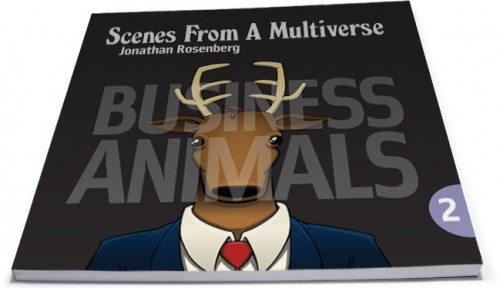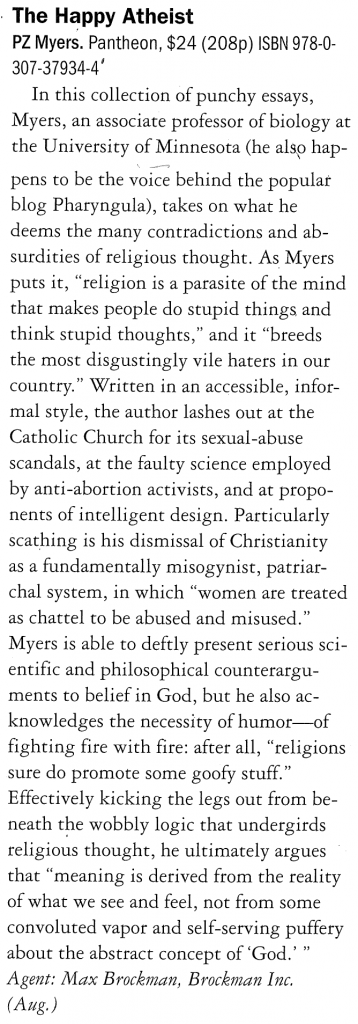Gang, don’t try this at home. I’m a trained professional, so I can get away with it, although I do face extreme risk of brain damage.
I am reading two books at once. OK, that part isn’t too scary, I’m actually just alternating between the two — an hour with one at lunch time, an hour or two with another before bed. I trust you all are able to do this, no problem.
It’s the pairing that is the killer. In one corner, I’m reading the marvelously detailed, juicy, thought-provoking The Cambrian Explosion: The Construction of Animal Biodiversity by the highly regarded scientists, Erwin and Valentine. In the other corner, the tedious and misleading Darwin’s Doubt: The Explosive Origin of Animal Life and the Case for Intelligent Design
by the highly self-regarded philosopher and creationist apologist, Stephen Meyer.
Some would say I’m mad to do this; others would say the shock of the combination will drive me mad. They are both right, I fear.
I’m only a few chapters into each so far. The Erwin & Valentine book is terrific — a bit dense and technical, but full of the right stuff. I’m learning a great deal; it starts with material I’m not at all familiar with, the geochemistry of the pre-Cambrian. The point is to set the stage, to explain the environment in which the Cambrian explosion will occur, and also most importantly, to explain how scientists know what the world was like between a billion and 500 million years ago.
It also discusses real controversies and real science. For example, there was a world-wide shift in ocean and atmospheric chemistry during this period: was it primarily an abiotic process, or did the expansion of bacterial forms and the emergence of multicellular life contribute significantly?
We haven’t even gotten to the fossils yet, let alone the biology! I’m appreciating the education, though — the story simply cannot be understood without this background material. It’s also fueling an interest in, of all things, geology. I may have to read more about this subject.
The Meyer book, on the other hand…maybe it’s best that I am reading it in conjunction with some real science. The contrast is jarring and enlightening.
The first bit of this book is an extended whine about how no one understood his last book, Signature in the Cell, which was another gloppy bit of tripe from a mediocre mind with a magnificent ego. That book was entirely about the origin of life, he says, and how it’s impossible to create new information with undirected processes; everyone thought it was about how undirected processes can add information to existing organisms, but it wasn’t, and this new book about the Darwin’s Doubt and the Cambrian explosion is the one that is going to show that’s impossible, too. So he begins by repetitively reciting the same bogus assertions he made in his previous book.
The type of information present in living cells — that is, “specified” information in which the sequence of characters matters to the function of the sequence as a whole — has generated an acute mystery. No undirected physical or chemical process has demonstrated the capacity to produce specified information, starting from “purely physical or chemical precursors”. For this reason, chemical evolutionary theories have failed to solve the mystery of the origin of first life—a claim that few mainstream evolutionary theorists now dispute.
Simply rebutted: random peptides exhibit catalytic activity. There’s a process that starts from “purely physical or chemical” precursors and uses the information defined by the sequence of amino acids to produce a naturally selectable function. And I’m sorry, but what is an example of a non-physical, non-chemical process in biology?
Are we done yet?
Of course not. Meyer is going to drool out a few hundred pages of drivel that will only convince the gullible, the ignorant, and the already dedicated creationists. There is not one bit of substance in the book so far; just rehashed Intelligent Design creationist talking points. This “specified information” of which he speaks is undefined and unmeasurable — it’s the phrase they flap at anyone who challenges their claim of have concrete evidence against evolution.
Meyer then dives into more misleading statements, such as that the Cambrian biota just erupted abruptly into the fossil record, with no precursors — surely you don’t expect a creationist to explain the geological and biological context of the pre-Cambrian/Cambrian, as Erwin and Valentine do? That would take work and knowledge, which Meyer lacks. Nick Matzke at the Panda’s Thumb has torn into the superficiality and wrongness of Meyer’s arguments already — go read that if you want to see ID arguments taken down a notch.
Otherwise, wait a bit and somewhere in my looming frantic schedule I’ll be reading deeper into The Cambrian Explosion…and I see that the next section is titled “The Record of Early Metazoan Evolution”. I think I’ll trust Ervin and Valentine’s competence over Meyer’s religiously driven ignorance.
If this combo does not hurl me down the stairs of madness into the abyss of total chaotic brain-scrambling, there’s a third book gazing ominously at me from the bookshelf. I’ve been asked to consult with Tony Ortega, who runs an anti-scientology website on a public evisceration of Scientology: A History of Man by L. Ron Hubbard. It’s a “cold-blooded and factual history of your last 76 trillion years” — it contains Scientology’s version of evolution. I’m pretty sure I’ll be curled into a fetal ball, gibbering, by August.




